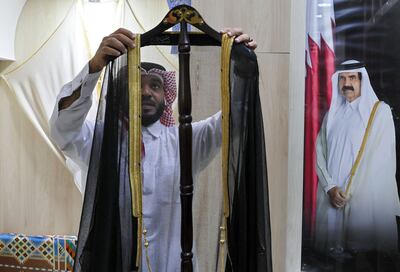When Argentina captain Lionel Messi lifted the World Cup trophy in Doha wearing a traditional bisht over his football kit, Khalifa Al Haroon's phone wouldn't stop buzzing.
“When Messi received the bisht, I was getting messages from all over the world,” Al Haroon says. “People were saying, this is great, it’s amazing, and where can I buy a bisht?”
Broadcast to a global audience of more than 3.5 billion people, it was undoubtedly a defining moment for the month-long tournament, with football embracing Middle Eastern culture. It also sent online enquires for the bisht through the roof.

A prominent online figure in Qatar, Al Haroon is the founder of the ILoveQatar platform, as well as a co-founder of RaqamiTV. With an infectiously positive narrative, he takes pride in sharing his country and culture with a wider audience.
As Argentina celebrated their victory, he remembered being inspired by a piece of art.
“I had Argentine friends sharing photos of the town square where they were all gathering and someone had put up a mural of Maradona wearing a thobe. They really embraced the experience, and I thought it was amazing," he says.
However, the sight of Messi wearing a bisht proved divisive for some people, sparking a wave of online hostility.
“Sadly, I started to see a lot of negative media, saying it shouldn’t have been done, and some even went as far as to say this is cultural appropriation.”
Al Haroon laughs at what he calls the absurdity of the claim. “I don’t even understand how that is a thing. It is us, as Arabs, giving him the bisht and we like it."
As the online war of words heated up, Al Haroon describes a tweet posted in response that outlined the wide reach of Arab culture. It explained how the robe, worn at graduation ceremonies, is a direct descendant of another Arab piece of clothing — the thobe.
Dating from the year 859, it was created by Fatima Al-Fihriya, founder of the University of Al-Qarawiyyin in Fez, Morocco, as a simple outfit for students.

“I thought Messi having the bisht is amazing. The entire national team, I want to them have one, too. I want to show that we appreciate them, and that they are special. This is their moment, and they all deserve a bisht.”
He then shared his idea of giving a personalised bisht as a gift to each member of the Argentina World Cup squad online, to gauge the reaction. “I put out that tweet saying I want to do this, what do you guys think, and who wants to collaborate with me?”
Making it a group effort was fundamental to Al Haroon. “I didn’t want to do this as a personal project, I wanted it to be a nice initiative,” he says.
The idea gained traction as people quickly began to come forward, offering their talents to help design the bisht and the packaging. "It was really beautiful to see everyone wanting to contribute."
Different companies supplied the bisht and, now, he says, his floor is covered in samples. "I want to find something that is right, that looks authentic and has flair.”
Inspired by designer Virgil Abloh, who died in 2021, Al Haroon is looking to put a twist on the traditional garment. “With Off-White, he would typically put text on traditional items, like a Persian rug that has 'carpet' written on it. So I thought, why not take the bisht and print the number of the player on the back? This way it becomes something that belongs to them.”
In Qatar, the garment is worn in three colours: black, brown and cream. Al Haroon’s biggest dilemma right now is which one to use.
“We are leaning towards the cream colour, and where you have the gold edging, we are trying to see if the company can put some blue stitching in it. This way it is our official bisht, with Argentina’s colours of blue, white and gold.”
While people can give their time for free, producing and shipping the finished robes to Argentina will cost money.
“That I am going to pay for,” Al Haroon says. “I know if I approached a shipper and said 'hey, want to collaborate?' I could get it for free, but I don't want to take money away from anyone. This is meant to be a gesture from us, not just Qataris, but from Arabs to say that we appreciate the players.”
The gift of a bisht is a fitting tribute to the players, especially having seen how keen World Cup visitors were to snap them up.
“The souq was full of foreigners all wearing the bisht and it was so funny. We wear it for special occasions, so to see random people in the middle of the street, walking around in the bisht and shorts — it was an unusual sight, but it was beautiful, really nice to see," he says.
Such a traditional item of clothing being worn by non-Arabs does raise the thorny issue, however, of whether it is disrespectful, as seen in this faux-pas of tourists wearing it with shorts.
“When it comes to the bisht, or the thobe, people ask, 'are you offended?' My answer is that Qataris do not own the thobe. No one owns it. It is something that is part of our culture," he says.
He and his co-collaborators are working to complete the robes and get them sent to the players.
“When we get the final sample, I will probably make a small video to showcase what it is that we have produced, because the community has been supportive and I want them to feel like they are part of the journey."
Now, with a high demand for the robes, Al Haroon seems to be only half-joking when he talks about the business opportunity for anyone looking to ship the garments overseas.
“Do you remember at the end of the film the Avengers, and Tony Stark/IronMan is on the ground and he says, ‘I want to have a shawarma?' And shawarma sales shot up, because everyone wanted to have one? I feel that this is that Tony Stark moment. What's a bisht? I want a bisht!”
In this media-savvy age, the goal might seem to be to get some short-term attention, but Al Haroon explains it is about something larger.
"It’s not about the publicity. This is a gesture that Qataris, Emiratis and any expat who lives in the region will know. It’s just about being generous and being kind to your guests.”



















